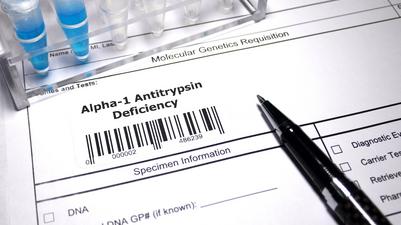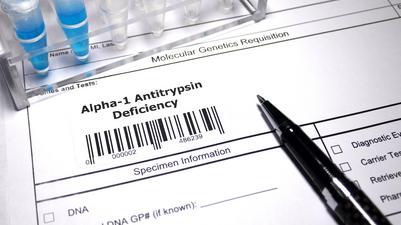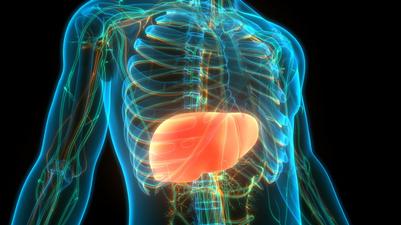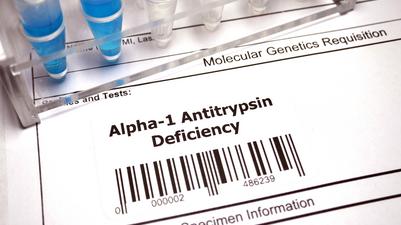Disease name: Alpha-1 Antitrypsin Deficiency
ICD-10 Disease Code: E88.01 - Alpha-1 Antitrypsin Deficiency
ICD-10 Disease Group: E88 - Other and unspecified metabolic disorders
General description:Alpha-1 antitrypsin deficiency (AATD) is a genetic condition that increases the risk of developing lung and liver diseases. People with AATD do not produce enough alpha-1 antitrypsin (AAT).
AAT is produced by the liver and plays a crucial role in protecting the lungs from inflammation and harmful substances such as smoke. When the liver doesn't produce sufficient AAT, the lungs become more susceptible to damage from smoking, pollution, and dust. This can lead to a severe lung condition known as chronic obstructive pulmonary disease (COPD). Additionally, AAT deficiency can cause liver disease, including cirrhosis, which is more frequently seen in children with AATD.
Mutations:AATD is caused by mutations in the SERPINA1 gene, which encodes the alpha-1 antitrypsin (AAT) protein. The disease is inherited in an autosomal-recessive manner, meaning that individuals that carry two mutated copies of the SERPINA1 gene manifest the symptoms of AATD. Those with a single mutated copy are carriers and have a slightly elevated risk of lung disease, especially if they smoke or have other risk factors, and can transmit the mutation to their offspring.
Several types of mutations in the SERPINA1 gene that can cause AATD. These mutations can either reduce the quantity of AAT produced by the liver, completely inhibit the production of AAT, or alter the structure of the AAT protein, preventing its release from the liver, thereby failing to protect the lungs and leading to the accumulation of AAT in the liver, causing hepatic damage over time.
Disease frequency:Alpha-1 Antitrypsin Deficiency affects approximately 1 in 1,500 to 3,500 individuals with European ancestry. It is uncommon in people of Asian descent.
Symptoms:AATD can present with a variety of symptoms, although some individuals may remain asymptomatic. When symptoms appear, they typically manifest between the ages of 20 and 50 years. Common respiratory symptoms include wheezing, shortness of breath - particularly following exercise, a chronic cough with phlegm, and recurrent respiratory infections such as colds and flu. Additionally, individuals may experience chest pain, fatigue, a rapid heartbeat upon standing, vision problems, and unintentional weight loss.
In some cases, AATD can lead to liver damage, presenting with symptoms such as jaundice, characterised by a yellowing of the skin and eyes, and swelling in the legs. Though rare, AATD can also cause dermatological issues, including painful lumps or patches on the skin. The variability and range of symptoms underscore the importance of considering AATD in differential diagnoses, particularly for patients with unexplained respiratory or liver conditions.
Treatment:While there is no cure for AATD, several treatments are available to manage symptoms and slow the progression of lung damage. Treatment strategies often include inhaled medications to improve breathing, pulmonary rehabilitation programmes to enhance lung function, and oxygen therapy for those with severe respiratory issues. Augmentation therapy, a lifelong treatment involving the administration of AAT protein derived from donor blood, can increase AAT levels in the lungs and slow lung damage, though it does not prevent liver damage.
For individuals with severe lung or liver damage, surgical interventions may be necessary. Lung surgery or lung transplants can be considered for those with critically damaged lungs, while liver transplants are an option for those with significant liver damage. Preventive measures are also crucial in managing AATD. Quitting smoking, avoiding secondhand smoke, and minimising exposure to dust and air pollution can help delay lung damage. Additionally, patients should consult their healthcare provider regarding the need to abstain from alcohol to protect liver health.
Sources:- https://www.icd10data.com/
- https://www.orpha.net/consor/cgi-bin/index.php
- https://rarediseases.org/
- https://medlineplus.gov/genetics/
- https://www.cdc.gov/








